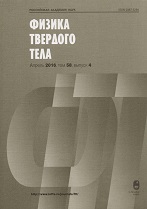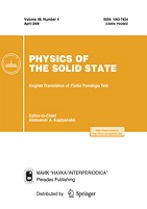|
This article is cited in 2 scientific papers (total in 2 papers)
Semiconductors
Features of electrical properties of BE-C(Fe) biocarbons carbonized in the presence of an Fe-containing catalyst
V. V. Popova, T. S. Orlovaba, A. Gutierrez-Pardoc, J. Ramirez-Ricoc
a Ioffe Institute, St. Petersburg
b St. Petersburg National Research University of Information Technologies, Mechanics and Optics
c Instituto de Ciencia de Materiales de Sevilla, Universidad de Sevilla, Sevilla, Spain
Abstract:
The effect of partial graphitization on electrical and galvanomagnetic properties of BE-C(Fe) biomorphic carbons produced by beech wood carbonization at temperatures of 850–1600∘C in the presence of an iron-containing catalyst is studied. The use of an Fe catalyst at Tcarb⩾ 1000∘C leads to the formation of nanoscale graphite-phase inclusions; its total volume and nanocrystallite sizes increase with Tcarb. The data on the carrier concentration and mobility are obtained. It was shown that partially graphitized BE-C(Fe) carbons with Tcarb⩾ 1000∘C in the conductivity type and magnetoresistance features relate to highly disordered metal systems whose conductivity can be described taking into account the contribution of quantum corrections, mainly the correction caused by the electron–electron interaction. It is shown that nonmonotonic dependences of the Hall constant R on the magnetic field are characteristic of BE-C(Fe) samples with 1000 ⩽Tcarb< 1600∘C, which is most probably caused by the contribution of various carrier groups, i.e., electrons and holes. In BE-C(Fe) samples with Tcarb = 1600∘C, the Hall coefficient corresponds to the metal state, which is associated with conducting medium homogenization resulting from the formation of a significant graphite phase volume.
Received: 05.09.2016
Citation:
V. V. Popov, T. S. Orlova, A. Gutierrez-Pardo, J. Ramirez-Rico, “Features of electrical properties of BE-C(Fe) biocarbons carbonized in the presence of an Fe-containing catalyst”, Fizika Tverdogo Tela, 59:4 (2017), 688–694; Phys. Solid State, 59:4 (2017), 703–709
Linking options:
https://www.mathnet.ru/eng/ftt9606 https://www.mathnet.ru/eng/ftt/v59/i4/p688
|


| Statistics & downloads: |
| Abstract page: | 48 | | Full-text PDF : | 9 |
|





 Contact us:
Contact us: Terms of Use
Terms of Use
 Registration to the website
Registration to the website Logotypes
Logotypes









 Citation in format
Citation in format 